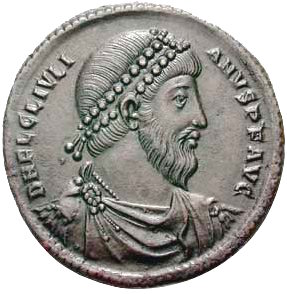Ancient Roman philosophy
Ancient Roman philosophy refers to the philosophical thought that emerged in Ancient Rome and was heavily influenced by Ancient Greek philosophy. Roman philosophy is often considered a continuation and adaptation of Greek philosophical traditions, with significant contributions from Roman thinkers.
Historical Context[edit | edit source]
Ancient Roman philosophy developed during the period of the Roman Republic and the Roman Empire. It was characterized by the integration of Greek philosophical ideas into Roman culture. The Romans were particularly influenced by the works of Plato, Aristotle, and the Stoics.
Major Philosophical Schools[edit | edit source]
Several major philosophical schools were prominent in Ancient Rome:
Stoicism[edit | edit source]
Stoicism was one of the most influential schools of thought in Ancient Rome. It emphasized rationality, self-control, and virtue as the path to a good life. Key Roman Stoic philosophers include Seneca the Younger, Epictetus, and Marcus Aurelius.
Epicureanism[edit | edit source]
Epicureanism was another significant school of thought. It taught that the purpose of life was to attain pleasure and avoid pain, with an emphasis on simple living and the pursuit of intellectual pleasures. Lucretius was a notable Roman Epicurean philosopher.
Skepticism[edit | edit source]
Skepticism in Ancient Rome was represented by philosophers who questioned the possibility of certain knowledge. Cicero was a prominent figure who engaged with skeptical ideas, although he is more commonly associated with Eclecticism.
Eclecticism[edit | edit source]
Eclecticism was a philosophical approach that combined elements from various schools of thought. Cicero is a key example of an eclectic philosopher, drawing on Stoic, Epicurean, and Academic ideas.
Key Philosophers[edit | edit source]
Several philosophers made significant contributions to Ancient Roman philosophy:
- Seneca the Younger: A Stoic philosopher and statesman known for his works on ethics and his letters.
- Epictetus: A former slave who became a prominent Stoic teacher, known for his discourses and the Enchiridion.
- Marcus Aurelius: A Roman emperor and Stoic philosopher, famous for his work Meditations.
- Lucretius: An Epicurean philosopher and poet, best known for his didactic poem De Rerum Natura.
- Cicero: An orator, statesman, and philosopher who contributed to various philosophical discussions and promoted Eclecticism.
Influence and Legacy[edit | edit source]
Ancient Roman philosophy had a lasting impact on Western thought. The works of Roman philosophers were preserved and studied throughout the Middle Ages and the Renaissance, influencing later philosophical developments. The integration of Greek philosophy into Roman culture helped to transmit these ideas to future generations.
Related Pages[edit | edit source]
- Ancient Greek philosophy
- Roman Republic
- Roman Empire
- Seneca the Younger
- Epictetus
- Marcus Aurelius
- Lucretius
- Cicero
- Stoicism
- Epicureanism
- Skepticism
- Eclecticism
Categories[edit | edit source]
This article is a philosophy-related stub. You can help WikiMD by expanding it!
Search WikiMD
Ad.Tired of being Overweight? Try W8MD's physician weight loss program.
Semaglutide (Ozempic / Wegovy and Tirzepatide (Mounjaro / Zepbound) available.
Advertise on WikiMD
|
WikiMD's Wellness Encyclopedia |
| Let Food Be Thy Medicine Medicine Thy Food - Hippocrates |
Translate this page: - East Asian
中文,
日本,
한국어,
South Asian
हिन्दी,
தமிழ்,
తెలుగు,
Urdu,
ಕನ್ನಡ,
Southeast Asian
Indonesian,
Vietnamese,
Thai,
မြန်မာဘာသာ,
বাংলা
European
español,
Deutsch,
français,
Greek,
português do Brasil,
polski,
română,
русский,
Nederlands,
norsk,
svenska,
suomi,
Italian
Middle Eastern & African
عربى,
Turkish,
Persian,
Hebrew,
Afrikaans,
isiZulu,
Kiswahili,
Other
Bulgarian,
Hungarian,
Czech,
Swedish,
മലയാളം,
मराठी,
ਪੰਜਾਬੀ,
ગુજરાતી,
Portuguese,
Ukrainian
Medical Disclaimer: WikiMD is not a substitute for professional medical advice. The information on WikiMD is provided as an information resource only, may be incorrect, outdated or misleading, and is not to be used or relied on for any diagnostic or treatment purposes. Please consult your health care provider before making any healthcare decisions or for guidance about a specific medical condition. WikiMD expressly disclaims responsibility, and shall have no liability, for any damages, loss, injury, or liability whatsoever suffered as a result of your reliance on the information contained in this site. By visiting this site you agree to the foregoing terms and conditions, which may from time to time be changed or supplemented by WikiMD. If you do not agree to the foregoing terms and conditions, you should not enter or use this site. See full disclaimer.
Credits:Most images are courtesy of Wikimedia commons, and templates, categories Wikipedia, licensed under CC BY SA or similar.
Contributors: Prab R. Tumpati, MD



